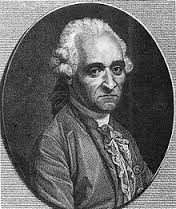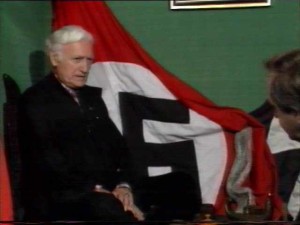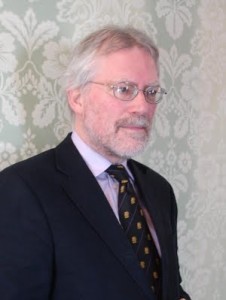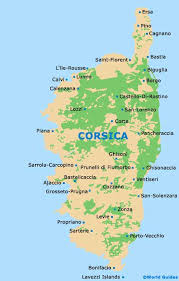Joscelyn Godwin
d’Eraines, Jean (L)
Jean d’Eraines was the author of the 1914 book, Le probleme des origines et des migrations[1056], in which, according to Sprague deCamp, he identified the Arctic as the home of Atlantis. The original French text is available online(a). I note that he was not mentioned in Joscelyn Godwin’s Arktos and has also been accused of being pseudo-scientific(b).
(a) https://gallica.bnf.fr/ark:/12148/bpt6k6571245x.r=.langES
Court de Géblin, Antoine
 Antoine Court de Géblin (1725-1784) was formerly a Protestant pastor who later turned to seek esoteric wisdom through the Tarot! He claimed that the Tarot cards were the work of the ancient Egyptians, being one of their books that escaped the flames that devoured their superb libraries!(a)
Antoine Court de Géblin (1725-1784) was formerly a Protestant pastor who later turned to seek esoteric wisdom through the Tarot! He claimed that the Tarot cards were the work of the ancient Egyptians, being one of their books that escaped the flames that devoured their superb libraries!(a)
According to Joscelyn Godwin[746.36] quoting Fabre d’Olivet, Court believed that Corsica and Sardinia held the remains of Atlantis.
Serrano, Miguel
Miguel Serrano (1917-2009) was a former Chilean diplomat in which capacity he was  appointed ambassador to India from 1953 until 1962. He was also an unrepentant nazi sympathiser since 1939 and over time he developed what became known Esoteric Nazism, which continues to have support particularly in his native Chile, where there are still substantial numbers of Nazi followers(a).
appointed ambassador to India from 1953 until 1962. He was also an unrepentant nazi sympathiser since 1939 and over time he developed what became known Esoteric Nazism, which continues to have support particularly in his native Chile, where there are still substantial numbers of Nazi followers(a).
*Joscelyn Godwin relates[789.126] how Serrano claimed that “the Germans also found there was a way of communication with the Hollow Earth and its secret cities, where the First Hyperboreans had taken refuge from the disaster that reversed the Poles. There a secret base was prepared during the war years, and thither Adolf Hitler escaped in a vimana (flying saucer plane) to direct the “esoteric war” to this day.”*
The spitfirelist website notes that when “Serrano returned to Chile after the Pinochet coup in 1973. Finding the regime unsympathetic to his ideas, he adopted “the role of intellectual gadfly“.[9] In May 1984, Serrano gave the Nazi salute at the funeral in Santiago of SS Colonel Walter Rauff.[9] He convened a rally in Santiago on 5 September 1993, in honor of Rudolf Hess, and in memory of the 62 young Chilean Nazi supporters who were shot dead while occupying a social security building during an abortive coup in 1938.[1][10] “(c)
Two books by the Chilean historian, Rafael Videla Eissmann, are concerned with Serrano’s views on Atlantis. Many of his other works, mainly in Spanish, are available as pdf files(b).
(a) https://www.pbs.org/frontlineworld/fellows/chile_2008/
(b) https://www.pdfarchive.info/index.php?pages/Se
(c) https://spitfirelist.com/for-the-record/ftr-873-the-new-age-fascism-and-the-atlantis-myth/
Godwin, Joscelyn
Joscelyn Godwin (1945- ) was born in England and is currently professor of  musicology at Colgate University in Hamilton, New York. Although he has written on his chosen subject he has also ventured into the realms of Theosophy, the Mystery Traditions and the esoteric generally. Included in his output is a life of Athanius Kircher[1130].*In 2009, this book was revamped as Athanasius Kircher’s Theatre Of The World, which has been described as “essentially a big-budget version of the previous book.” [1593]*
musicology at Colgate University in Hamilton, New York. Although he has written on his chosen subject he has also ventured into the realms of Theosophy, the Mystery Traditions and the esoteric generally. Included in his output is a life of Athanius Kircher[1130].*In 2009, this book was revamped as Athanasius Kircher’s Theatre Of The World, which has been described as “essentially a big-budget version of the previous book.” [1593]*
In his 1996 book Arktos[789] he traces the history of polar wandering theories together with the polar connection with some Nazi ideology. His latest offering, Atlantis and the Cycles of Time[746] is a very comprehensive history of occult view of the Atlantis mystery.
A brief biography of Godwin together with his impressive bibliography is available on the Colgate University website(a).
Rosenberg, Alfred
Alfred Rosenberg (1893-1946) was born Tallinn, Estonia, then part of the  Russian Empire.. Like Ivar Lissner he spent some of his early years in Russia before emigrating to Germany. He is considered to have been one of the leading theorists behind many of the extreme policies of the Nazi Party, in particular its racial ideology. He was later tried for war crimes and hanged in 1946.
Russian Empire.. Like Ivar Lissner he spent some of his early years in Russia before emigrating to Germany. He is considered to have been one of the leading theorists behind many of the extreme policies of the Nazi Party, in particular its racial ideology. He was later tried for war crimes and hanged in 1946.
Rosenberg adopted many of Rudolf Steiners ideas regarding Atlantis, adding a few colourful touches of his own such as referring to a master race of ‘Aryan-Nordic-Atlanteans’ in Northern Europe. He added that Atlantis had existed where there had once been exposed land between Iceland and Greenland when sea levels were 100 metres lower.
He expressed much of his warped ideas in a 1930 book The Myth of the Twentieth Century, which has been described by Joscelyn Godwin as “perhaps the dullest book that ever sold a million copies.”In fact the sales of his book were only exceeded by that of Hitler’s Mein Kampf.
A secondhand copy of the English translation was recently on offer at Amazon.uk for over £400! However, you can download the text for nothing from the Internet(a) .
Nazis and Atlantis
Nazis and Atlantis
One of the most bizarre and tragic outcomes of Plato’s 2,400-year-old story is the fact that it was seized upon by elements in the Nazi regime as part of the foundation for their extreme nationalistic and racist views. The Nazi search for Atlantis was institutionalised with the creation of the SS Ahnenerbe by Heinrich Himmler.
Vanessa Ward has written a useful review of the nationalistic use of the Atlantis story by both Rudbeck and the Nazis(a).
Heather Pringle adds further insights in her excellent book, The Master Plan[0032].
Since the war, Nazi philosophy has persisted in a variety of forms, the most extreme being the killing of 77 people by the Norwegian, Anders Breivik in 2011.
Less violent were the writings of Miquel Serrano who offered what he called ‘Esoteric Hitlerism.’(b) Other Nazi factions are outlined in Joscelyn Godwin‘s book, Arktos[0789].
From the calm of 21st century rural Ireland, it seems incredible to this compiler, that something as horrific as the Jewish Holocaust could have had any connection, however vague, with the writings of a Greek philosopher who wrote nearly two and a half millennia ago.
Thorwald C. Franke has highlighted(c) that recently(2017), a small German right-wing group, ‘Pro Deutschland’, has cited on their website the ‘superior civilisation’ of Atlantis in support of their extremist views.
More recently (2021), Franke has taken issue with a Smithsonian video, which implied that a belief in Atlantis was prevalent among the upper echelons of Germany’s National Socialism. However, Franke maintains that apart from Himmler, most senior Nazis, including Hitler had no interest in Atlantis. Anyway, when Franke wrote to the Smithsonian pointing out how they had overstated this Nazi support for Atlantis, he found that his comments were blocked and the same institution failed to respond to a follow-up email(d)!>In a subsequent newsletter (No. 173), he added further evidence that most of the top Nazi echelons had little or no interest in Atlantis(e).<
(a) http://pseudoarchaeology.org/a10-ward.html
(b) https://spitfirelist.com/for-the-record/ftr-873-the-new-age-fascism-and-the-atlantis-myth/
(c) https://www.atlantis-scout.de/atlantis_newsl_archive.htm Newsletter No. 90
>(d) Atlantis Newsletter Archive – Atlantis-Scout Newsletter No. 167
(e) https://www.atlantis-scout.de/atlantis_newsl_archive.htm Newsletter No. 173<
Corsica .
Corsica together with Sardinia was the home of megalith builders long before it became an Etruscan colony. The island was seldom mentioned as a  location for Atlantis until the end of the 18th century when>according to Joscelyn Godwin [0746.36],<Antoine Court de Géblin proposed Corsica and Sardinia as the location of Atlantis.
location for Atlantis until the end of the 18th century when>according to Joscelyn Godwin [0746.36],<Antoine Court de Géblin proposed Corsica and Sardinia as the location of Atlantis.
>However, Atlantisforschung claims that as far as is known, Corsica was first associated with Atlantis, later, in 1840. At that time it was the lawyer Angelo Mazzoldi, an ardent Italian nationalist, who claimed in a treatise that Italy had once been Atlantis, the center of which was somewhere near Corsica. He dated the sinking of Atlantis to 1986 BC(e).<
Corsica did not feature again for over a century until 1929 when this idea was proposed at a meeting of the Society for Atlantis Studies, held in the Sorbonne in Paris, a delegate threw two tear gas bombs in order to prevent the dissemination of such ‘heresy’.
It may be worth considering that the Weshesh, listed as one of the Sea Peoples, have been identified with the inhabitants of Corsica among others. In the latter part of the 2nd millennium BC, a civilisation known as the Torreans occupied the region around Ajaccio. Like the Nuraghic people in nearby Sardinia, they also built towers, but smaller in size.
Before the Torreans, there was a string of megalithic dolmens stretching from southern Corsica across to northern Sardinia as if outlining a pilgrimage route. Frederico Bardanzellu’s website(a) offers more information on this and other aspects of the prehistory of these two islands, including a study of any possible astronomical significance that might be deduced from the orientation of the dolmens on both islands.(d)
Luigi Usai is currently (2021) promoting [1814] the idea that a conjoined Sardinia and Corsica had constituted the island of Atlantis!(c) He has named Sulcis at the southern end of Sardinia as the location of its capital.
In July 2021 I was sent a number of images that purported to show anomalous underwater images in the Central Mediterranean northeast of Malta. At first sight, they appeared to show extensive manmade features. However, further investigation by the person who sent them to me eventually discovered that the images were the consequence of the flawed computer interpretation of sonar data. In December 2021 Luigi Usai produced the same flawed imagery as evidence that he had discovered a lost submerged civilisation!
So that there is no misunderstanding let me state that I have advocated a Central Mediterranean location for Atlantis for some years. If Sardinia and/or Corsica hold that location, I am more than happy to congratulate Usai and Frau. But, I am not convinced by satellite imagery that has so often been proven to be flawed.
The Torreans have only been recognised since 1954, thanks to the work of archaeologist Roger Grosjean (1920-1975). A 1966 article by Grosjean is available online(b). The title of his paper, The Mysterious Horned Warrior – Torreans of the Isle of Corsica, brings to mind the horn-helmeted Sea Peoples depicted at Medinet Habu, a similarity not lost on Grosjean.
‘The Sea Peoples’ have been suggested, by a number of Atlantologists, as a collective name for the Atlantis federation.
(a) http://www.museodeidolmen.it/englishdefault.html
(c) https://www.atlantisfound.it/2021/01/24/why-didnt-scientists-find-atlantis-before-usai-luigi/
(d) https://www.museodeidolmen.it/englisharcheoastr.html
(e) Corsica (island) – Atlantisforschung.de (atlantisforschung-de.translate.goog) *
Jacolliot, Louis
Louis Jacolliot (1837-1890) was a French barrister, a colonial judge (in southern India and Tahiti) and a writer. He was devoutly anticlerical and saw Christianity as a poor imitation of the more ancient oriental religions. He was the author of The Bible in India in which he traced the Hindu origins of Hebrew and Christian revelation.
He was  obsessed with Indian occultism and collected Sanskrit myths and interpreted some of them as telling of a sunken continent, Rutas, in the Indian Ocean. However, he decided to move this lost land to the Pacific and as a consequence, Jacolliot was quoted as an ‘authority’ by Blavatsky when she sought support for her own invention – Lemuria. Later this was embellished even further by William Scott Elliott. Jacolliot presented his sunken land as an echo of Plato’s Atlantis.
obsessed with Indian occultism and collected Sanskrit myths and interpreted some of them as telling of a sunken continent, Rutas, in the Indian Ocean. However, he decided to move this lost land to the Pacific and as a consequence, Jacolliot was quoted as an ‘authority’ by Blavatsky when she sought support for her own invention – Lemuria. Later this was embellished even further by William Scott Elliott. Jacolliot presented his sunken land as an echo of Plato’s Atlantis.
Joscelyn Godwin notes that Jacolliot is also credited with the invention of the story of Agartha[789.81].
At least two of Jacolliot’s books, Occult Science in India [1382]+ and The Bible in India [936]+, are now available online in English.
[936]+ https://archive.org/details/bibleinindiahind00jacorich *
[1382]+ http://www.sacred-texts.com/eso/osi/osi00.htm *
Occult
An Occult connection with Atlantis was first suggested by Blavatsky with a very brief mention in her earliest (1877) book, Isis Unveiled [1834], and then cashing in on the popularity of Donnelly’s book, let her imagination run riot with a lengthier elaboration in Secret Doctrine [1495]. Her literary lunacy was eagerly accepted by her gullible followers in the Theosophical Society. A German variant of theosophy was developed by Rudolf Steiner with even more bizarre claims regarding Atlantis. Waldorf schools founded by Steiner are still operating today and continue to draw accusations of racism(a)(b).
>Lewis Spence was the author of An Encyclopedia of Occultism [1930] in 1920 and later The Occult Sciences in Atlantis [0260].<
A wide-ranging overview of the contribution of mystics and occultists to the question of Atlantis is provided in Joscelyn Godwin’s book, Atlantis and the Cycles of Time [746].
(a) http://www.waldorfcritics.org/active/articles.html#Racism
